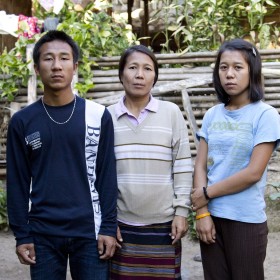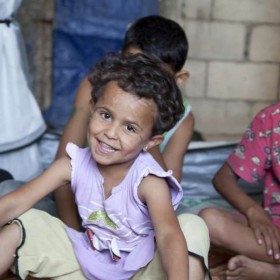Najaf’s Story, Indonesia

Najaf sits with his three sons on the only bed in their single-room home in Makassar, Indonesia. Photo by V. Tan/2013.
Najaf Ali first became a refugee in 1980, fleeing the Soviet occupation of Afghanistan and seeking refuge in neighbouring Iran. All his five children were born there. Twenty-two years later, they were among the first families to return home after the fall of the Taliban regime. Recalling his decision, Najaf says:
“Many of my friends moved to Europe at the time. With my savings and land I could easily have gone. But I had big hopes for Afghanistan. Life was good in Kabul. I managed a sports club for martial arts, and my boys trained to become karate champions.
But in Afghanistan there was a big commander in my area linked to the Taliban. He wanted to take my daughter by force; people said they wanted to kill us.”
Najaf thought it was better to leave Afghanistan again.
“I heard of someone who went to Indonesia and wanted to do the same. They [smuggling agents] sent a work visa for me and student visas for the children in Malaysia. On 23 January 2013 we planned to take a boat to Indonesia and move onward to Australia. But my son was arrested on the way. My daughter and her husband went ahead but the rest of us stayed for four months to wait for his release. UNHCR helped to release him from detention. Then on 23 May 2013 we arrived in Indonesia. The smuggler gave us tickets to fly to Makassar and said some people would meet us there in a park near the airport [to arrange for onward travel to Australia]. We waited for three hours but no one came. We called the number but no one answered. So we found our way to the Immigration office. We spent three days in detention and were then taken to the community housing where we remain today.”
However, other members of his family reached Australia.
“When I called my relatives in Kabul, they told me that my daughter and son-in-law were in Australia. From Indonesia, they had sailed for 15 days and stopped on different islands before they reached Christmas Island. They’re now living with my younger brother who went to Melbourne in 2002.”
But in July 2013, the Australian government announced that irregular maritime arrivals aiming to go to Australia would have no chance of being settled in Australia as a refugee. Instead they would be transferred to an offshore processing country as such Papua New Guinea or Nauru for their asylum claims to be assessed and for settlement if they are recognized as refugees. Najaf said:
“We are forced to wait here [in Indonesia]. The environment will not allow us to move forward. Australia isn’t accepting people, otherwise we would go. We remain here with no destiny. If we go back to Afghanistan, there will be danger, 100 per cent. It is better to live here. At least here we have peace, we don’t have to worry about our enemies.”









